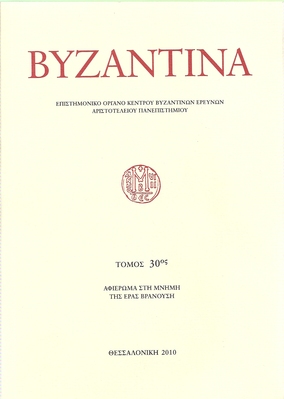Παρατηρήσεις σε εικονιστικά γλυπτά της ύστερης βυζαντινής περιόδου από την περιοχή του Πηλίου
Part of : Βυζαντινά : επιστημονικόν όργανον Κέντρου Βυζαντινών Ερευνών Φιλοσοφικής Σχολής Αριστοτελείου Πανεπιστημίου ; Vol.28, No.1, 2008, pages 289-305
Issue:
Pages:
289-305
Parallel Title:
Observations in marble reliefs of the Late Byzantine period in the region of Pelion
Author:
Abstract:
In the region of Pelion, during the Late Byzantine period, were constructed the monasteries of Oxeias Episkepsis and Neas Petras. Unfortunately, what have been saved from the monasteries are only ruins of marble and architectural parts used in the masonry of the later churches of the region. Three reliefs come out from these churches of which the two are votives; two depict Virgin and Christ, and the third depicts Archangel Michail.The reliefs were not found in their initial place and there are not sources to identify the place and the exact time of construction. However, the typological examination of the inscriptions and the technique used help us to place them chronologically in about the middle of the 13th century. Regarding their initial place the first two reliefs have the inscription Oxeia Episkepsis and they are attributed to the homonymous church of Makrinitsa. The relief of Archangel Michail causes greater questioning. Through a comparative study, it has been observed that Archangel and Virgin bear common characteristics, such as the excellent relief, the plasticity of the figures, the identical way of the footstool depiction, which all certify that they are not only constructed at the same period but they also come from the same origin.Regarding the place of their construction, they were possibly made in a workshop of the wider region, which was distinguished for its artistic eloquence. The technicians possibly came from Despotate of Epirus and they were influenced by the West, as Archangel Michail bears some westerner characteristics.
Subject:
Subject (LC):
Notes:
Το άρθρο περιέχεται στο αφιέρωμα στη μνήμη του Γεωργίου Λάββα




